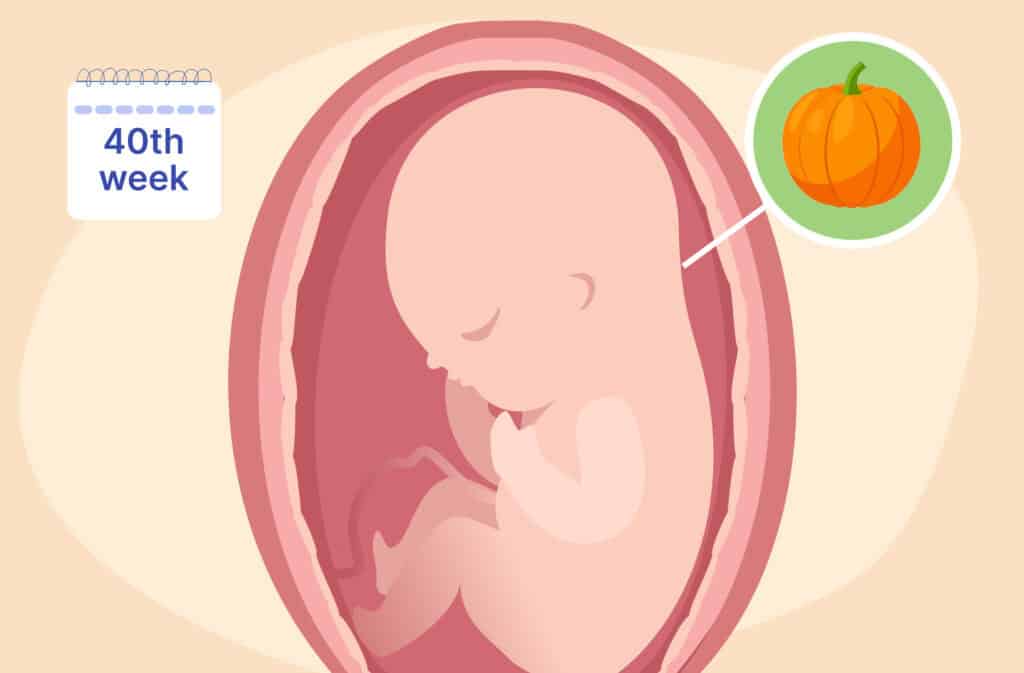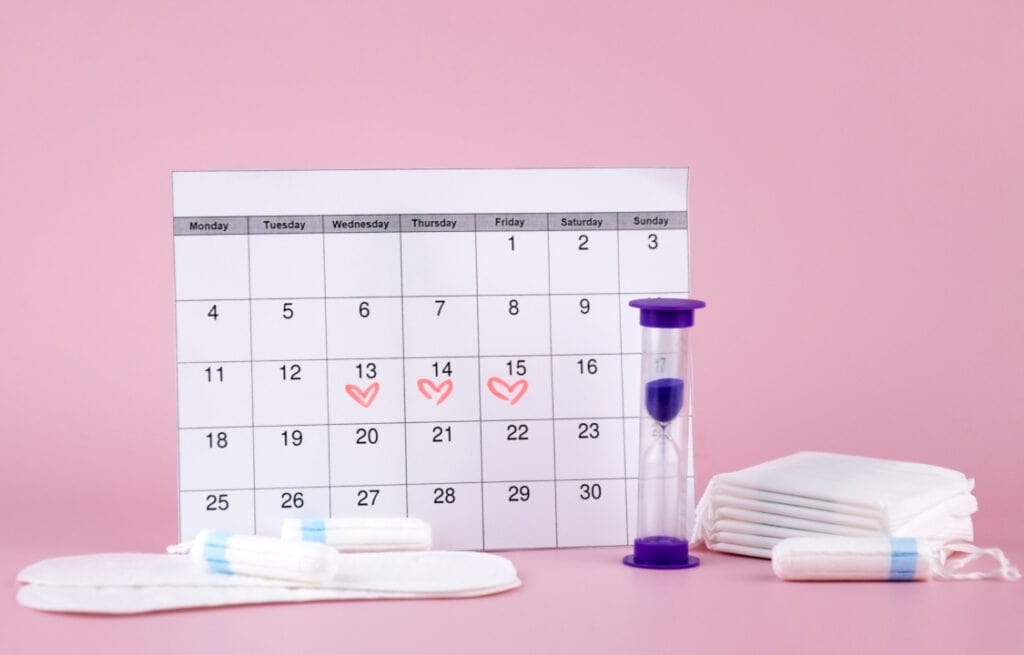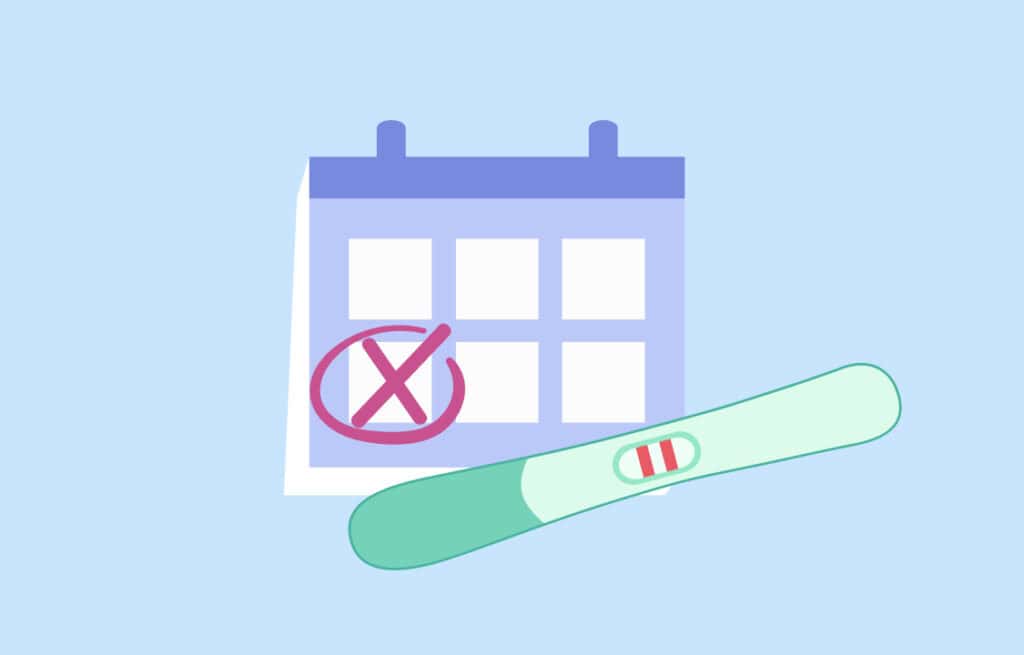Femia > Health Library > Pregnancy > Pregnancy week by week > 40 Weeks pregnant: Full-term baby, symptoms, and delivery prep
40 Weeks pregnant: Full-term baby, symptoms, and delivery prep

- Updated Feb 14, 2025
- Published
CRAFTED BY HUMAN
Crafted by human At Femia, we provide accurate and up-to-date information at every stage of your journey, from trying to conceive, pregnancy and postnatal support. All content is created by a real person based on in-depth research and own professional experience. Femia ensures that you will receive expert advice, strict accuracy and a personalized approach from our authors/medical experts. Learn more about our editorial policy.
FACT CHECKED
Fact checked At Femia Health, we maintain the highest standards of editorial excellence in delivering content focused on helping you conceive, guiding you through pregnancy, and supporting you postpartum. Explore our content review principles to learn how we ensure the accuracy and quality of our health and lifestyle tips for every stage of your journey.

Created with Hector Chapa, MD, FACOG, Clinical associate professor, Obstetrics and Gynecology Texas A&M University, College of Medicine in Bryan-College Station, USA
- At 40 weeks pregnant, your baby is fully developed, and your body is ready for labor. At this stage, they weigh approximately 3.4 kilograms (7.5 pounds) and measure about 20-21 inches long.
- Watch for labor signs, manage discomfort, and prepare for postpartum care.
- Here are signs that labor may be near: regular, intense contractions, water breaking, losing y, and lower back pain.
Congratulations—you’ve made it to 40 weeks pregnant and this is your due date! Your baby is now fully developed and ready to meet you. Whether you’re experiencing labor signs or still waiting, this week is about final preparations and managing the anticipation. Let’s dive into week 40 of pregnancy, including what symptoms to watch for, baby development, and how to get ready for postpartum life.
Let Femia guide you through with personalized tips and expert advice
tailored to your pregnancy journey
Pregnancy symptoms at 40 weeks
Here are common symptoms you may experience at 40 weeks:
Cervix ripening
Your healthcare provider may check your cervix to see if it’s ripening—softening, thinning, and opening. However, this is not a guaranteed predictor of when labor will begin, as some women progress quickly while others wait longer, even if their cervix is already dilating.
Water breaking
While movies often portray a dramatic water-breaking moment, it’s more common for the amniotic sac to rupture gradually or leak slowly. If your water breaks, you might experience a slow leak, and amniotic fluid is typically clear with a slightly sweet smell. If you’re unsure, wear a pad and wait to see if it gets wet. If your water breaks, call your doctor or midwife for guidance.
Back pain
The added weight from your baby and other pregnancy factors can cause significant back pain. About 60% of pregnant women experience this. If the pain becomes severe or changes suddenly, it might signal the onset of labor. Intense back pain during labor often occurs when the baby’s head presses on the lower back.
Contractions
Braxton Hicks contractions are often mistaken for labor contractions. Unlike Braxton Hicks, which are irregular and non-painful, real labor contractions are painful and come at regular intervals. Once contractions are strong and closer together, typically every 4-5 minutes, it’s time to contact your provider.
Insomnia
Insomnia during pregnancy is common, especially as you near your due date. This can be caused by physical discomfort, anxiety, or hormonal changes. To manage insomnia, try using pillows to support your body, develop a bedtime routine, and take naps during the day to make up for lost sleep.
Pelvic pain and pressure
As your baby drops lower, pelvic pain and pressure can increase. This can cause discomfort in your hips, groin, and pelvic floor. While it can be painful, this is a normal part of preparing for labor. Rest, ice, and finding comfortable sitting positions can help alleviate some of the pressure. You may also feel the need to urinate more frequently as your baby’s head engages in the pelvis.
👉Find out more: 39 Weeks pregnant: Discharge, spotting & birth readiness
Symptoms not to ignore at 40 weeks
- Regular, painful contractions. While Braxton Hicks contractions can be irregular and non-painful, regular and increasing pain during contractions could signal the start of active labor. If contractions grow more intense and are spaced regularly (about 4-5 minutes apart and lasting for 60 seconds or more), it’s a clear indication that labor may have begun. However, if contractions are painful but not getting closer together, it may still be a sign of early labor or something else like dehydration. Contact your healthcare provider if you’re unsure or if contractions persist without becoming regular.
- Heavy bleeding. Bright red bleeding, especially when it’s heavy and resembles a period, could indicate a serious complication, such as placenta previa or placental abruption. If this occurs, immediate medical attention is required. It’s important to contact your doctor or midwife right away if you experience heavy bleeding, as it can compromise both your health and the baby’s. Spotting or light bleeding is often normal, but anything beyond that should not be ignored.
- Decreased baby movements. As your baby grows, their movements may become less noticeable due to the limited space. However, a sudden and significant decrease in activity should not be overlooked. If your baby’s movements are slower or reduced drastically, it could be a sign of fetal distress. Immediately contact your healthcare provider for an assessment. It’s better to be cautious when it comes to reduced fetal movements.
- Severe headaches or vision changes. Severe headaches, especially those that don’t respond to typical headache remedies, or vision changes such as blurred vision or seeing spots, could be symptoms of preeclampsia—a pregnancy-related high blood pressure disorder. Preeclampsia can be dangerous for both mother and baby, causing complications such as organ damage or poor growth in the baby. If you experience any of these symptoms, seek medical attention immediately. Early diagnosis and treatment are crucial to manage preeclampsia safely.
Your body at 40 weeks pregnant
At 40 weeks, your body is fully prepared for the arrival of your baby, and the changes you’ve experienced over the past nine months are coming to a head. You may feel heavier than ever due to your baby’s size and the increased fluid retention. Pelvic pressure is common as your baby drops lower into your pelvis in preparation for birth, and this can make simple movements feel more cumbersome. You might also notice that your belly feels tighter as your body gets ready for contractions.
As you approach labor, it’s normal to experience difficulty getting comfortable while sitting or sleeping. Your growing baby and uterus put added pressure on your body, making it hard to find relief. You may have trouble finding a sleeping position, and rolling over in bed may feel more like a workout. This is your body’s way of preparing for the physical demands of labor. Many women experience mixed emotions, ranging from excitement to anxiety as they approach their due date. The key is to take it one step at a time and focus on self-care to manage discomfort as much as possible.
40 Weeks in months
You’re officially 9 months pregnant, though some women may deliver up to two weeks past their due date.
40 Weeks pregnant belly
Your belly will likely feel tight, and your skin may itch due to stretching. Twin pregnancies at 40 weeks often result in a larger and more prominent bump. Use a gentle moisturizer to reduce discomfort.
Baby development at 40 weeks
At 40 weeks, your baby is fully developed and ready to meet the world. Their organs are mature, and they have likely gained enough fat to help regulate their body temperature after birth. Your baby’s skin is smooth and soft, and they are continuing to grow stronger, particularly their muscles and bones, preparing for life outside the womb.
Baby at 40 weeks
- Weight: Around 3.4 kilograms (7.5 pounds).
- Length: Approximately 20-21 inches, your baby is about the size of a small pumpkin.
- Movements: As space becomes limited in the womb, your baby’s movements may feel slower, but they will still be strong and purposeful, with noticeable stretches, kicks, and rolls.
Although their growth has slowed down compared to earlier in the pregnancy, your baby’s lungs and digestive system are now fully prepared to function in the outside world. Their brain is also continuing to develop, and they are practicing critical skills like sucking and breathing. If you’re noticing decreased movement, don’t hesitate to contact your healthcare provider for reassurance.
Let Femia guide you through with personalized tips and expert advice
tailored to your pregnancy journey
Labor signs at 40 weeks
Here are signs that labor may be near:
- Regular, intense contractions: True labor contractions come at regular intervals and increase in intensity over time. Unlike Braxton Hicks contractions, which are irregular and often go away with movement or hydration, real contractions become stronger and closer together, often lasting about 30-70 seconds each. These contractions are a sign that your body is preparing for the birth of your baby.
- Water breaking: When your water breaks, the amniotic sac ruptures, releasing fluid. This can happen suddenly with a big gush or as a slow trickle. While not all women experience their water breaking before contractions begin, it’s a sign that labor may be imminent. Once your water breaks, it’s important to call your provider, as you’re at an increased risk of infection if labor doesn’t begin soon after.
- Losing your mucus plug: The mucus plug is a thick, jelly-like substance that seals the cervix during pregnancy. As labor approaches, this plug may come out, and it could be clear, pink, or tinged with blood. While losing the mucus plug doesn’t necessarily mean immediate labor, it is a sign that your cervix is beginning to open in preparation for delivery.
- Lower back pain: Intense, persistent lower back pain could signal the start of labor, especially when paired with other signs like regular contractions. The pain may be due to the baby’s position or the pressure on your lower back as the cervix begins to dilate. If the back pain becomes severe or is coupled with contractions, it could indicate back labor, which occurs when the baby’s head is positioned low and pressed against the spine.
👉Find out more: Best sex positions to induce labor: What works and what doesn’t
How to keep baby inside until 40 weeks
If you’re looking to reach full term, focus on staying healthy and avoiding stress.
- Stay hydrated: Dehydration can trigger preterm contractions.
- Rest often: Avoid strenuous activities and prioritize sleep.
- Monitor symptoms: Report any unusual changes to your healthcare provider promptly.
Health tips and self-care at 40 weeks pregnant
Stay active and prepare for labor
At 40 weeks, it’s essential to remain as active as possible to help prepare your body for labor. Gentle exercises such as walking, squatting, or pelvic tilts can encourage your baby to move into the optimal position for delivery. These exercises can also help alleviate discomfort from pelvic pressure and improve circulation, making you feel more comfortable. However, avoid overexertion and always listen to your body.
Ask about inducing labor
If you’re nearing your due date and haven’t gone into labor naturally, it’s okay to ask your doctor or midwife about inducing labor. While most pregnancies reach full-term before labor starts naturally, some women may require assistance to get things moving. If you have concerns, discuss induction options such as medications or natural methods, ensuring that you are well informed about the risks and benefits.
Rest and hydration
Despite the discomforts of late pregnancy, it’s crucial to prioritize rest. Sleep may be more difficult to come by, but try to rest as much as possible throughout the day. Drink plenty of fluids to stay hydrated, which will help prevent swelling and support overall bodily functions. Proper hydration is also key to making sure your body is ready for labor and delivery.
Practice breathing techniques
As labor approaches, it’s helpful to revisit relaxation and breathing techniques to manage pain and reduce stress. Practice deep, slow breaths to help calm your mind and body. Breathing exercises can help keep you relaxed during contractions and ensure that you have the stamina you need for labor.
Consider your birth plan
Review your birth plan with your healthcare provider, ensuring that both you and your partner are on the same page about your preferences for labor and delivery. This could include your preferred pain management options, birthing positions, and who you want in the room with you. Preparing for what lies ahead can reduce anxiety and help you feel more in control when labor begins.
Use comfortable support
Support your body with pillows, a warm bath, or a pregnancy belt to alleviate any discomfort from your growing belly. These can help take pressure off your back and pelvis, making it easier to get through the final days of pregnancy. If you’re feeling particularly uncomfortable, ask your partner or family for help with tasks or self-care.
Taking care of yourself during these final weeks will help ensure you are physically and mentally prepared for the upcoming arrival of your baby. Keep focusing on comfort, hydration, and relaxation while awaiting labor.
Questions from the Femia community
How to prepare myself for breastfeeding?
Start by learning about proper latching techniques and breastfeeding positions. Investing in nursing bras and nipple creams can help ease the process. Talk to a lactation consultant or attend a prenatal breastfeeding class to feel more confident.
How long will I stay in the hospital after delivery?
Most vaginal deliveries require a 1-2 day stay, while C-sections typically require 2-3 days. Your stay may vary depending on your recovery and your baby’s health.
What should I do if my baby stops moving?
Reduced or absent movements require immediate medical attention. If you notice significant changes, contact your provider right away for an evaluation.
Is it normal to be 40 or 42 weeks pregnant?
Yes, it's normal for many pregnancies to last anywhere from 40 to 42 weeks. Only a small percentage of babies are born on their due date.
Why am I cramping but no contractions at 40 weeks pregnant?
Cramping without contractions is common at 40 weeks as your body prepares for labor. It could be from Braxton Hicks contractions, pelvic pressure, or your body adjusting for delivery.
What if my due date is today but no signs of labor?
If your due date has passed with no signs of labor, it's still normal. Labor may start anytime in the next couple of weeks. Contact your healthcare provider for guidance and to discuss induction options if necessary.
The bottom line
Reaching 40 weeks of pregnancy means your baby is fully ready to meet the world. While many women go into labor naturally at this stage, it’s not uncommon to pass your due date without signs of labor. Your provider will guide you through next steps if necessary, such as monitoring or induction.
As you approach delivery, focus on recognizing labor signs like consistent contractions, water breaking, or losing your mucus plug. Continue preparing for postpartum life by ensuring you have all essentials for yourself and your baby, and consider breastfeeding or formula feeding options. Managing any late-pregnancy discomfort and staying in regular contact with your healthcare team will help you navigate this final stage with confidence. Soon, you’ll be holding your baby in your arms.
References
- “40 Weeks Pregnant: Symptoms, Baby Development & Tips.” BabyCenter, www.babycenter.com/pregnancy/week-by-week/40-weeks-pregnant.
- “Week 40 of Pregnancy: Symptoms, Baby Development & More.” What to Expect, www.whattoexpect.com/pregnancy/week-by-week/week-40.aspx.
- “40 Weeks Pregnant: Baby Development, Symptoms & Tips.” NHS, www.nhs.uk/pregnancy/week-by-week/1-to-12/40-weeks/.
- “Pregnancy Week 40: What to Expect.” American Pregnancy Association, www.americanpregnancy.org/healthy-pregnancy/week-by-week/40-weeks-pregnant/.

Can sex make your period come early? For those of you wondering how to make your period come faster, we have compiled a list of natural and safe methods.

Experiencing postpartum dizziness or vertigo? Learn about 7 common causes, how long it lasts, and treatment options. Discover when to seek help for lightheadedness after pregnancy.

Learn about the process of implantation, discover the early signs, such as implantation bleeding and cramping, and how the hormone hCG becomes detectable soon after.
